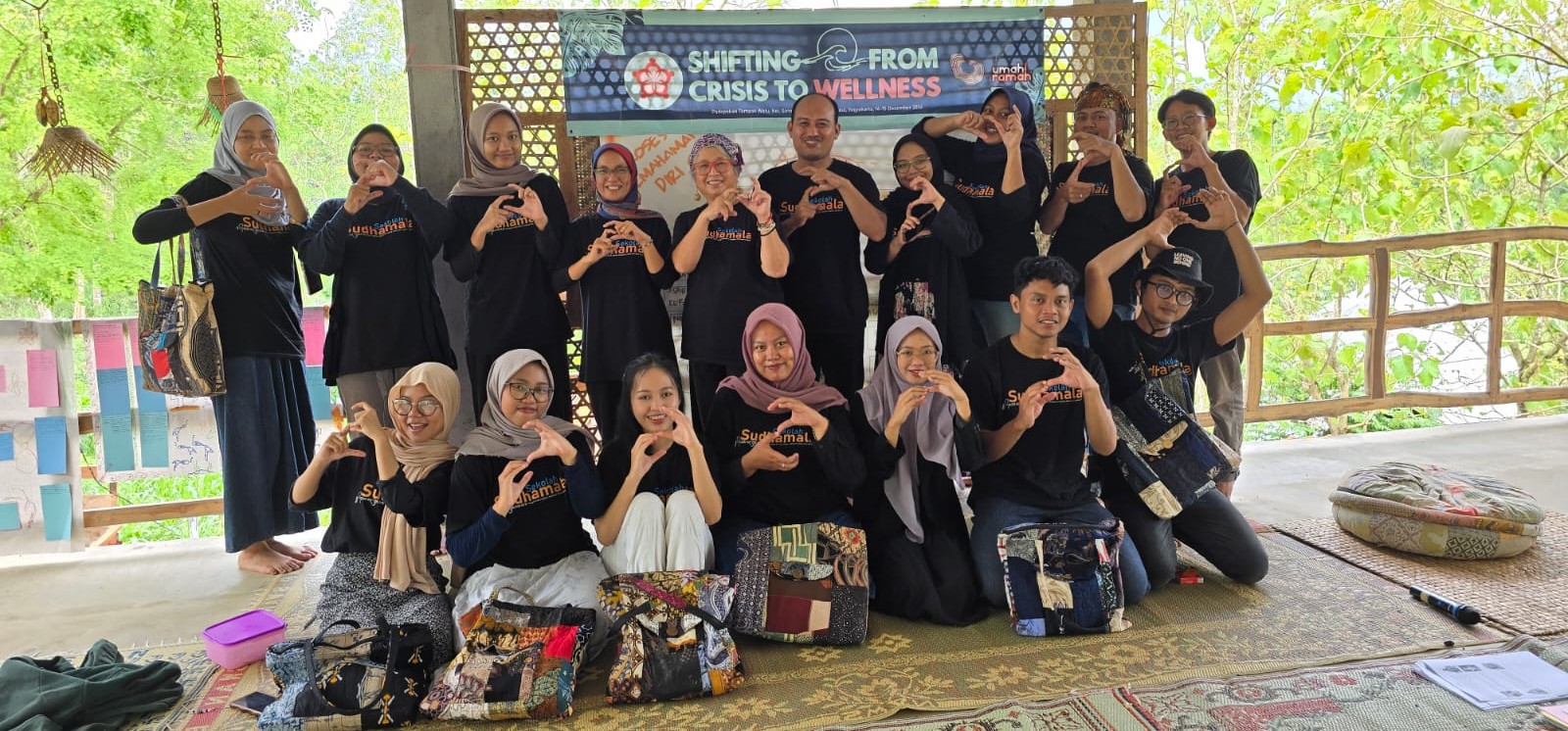By: Abdul Rosyidi
The Sudhamala School Retreat 2024 was held in Tompak Watu, Girimulyo, Panggang, Gunungkidul Regency, from December 13 to 16, 2024. Umah Ramah, NAPIESV, and Padepokan Tompak Watu collaborated to organize the activity, which drew 10 Sudhamala School 3rd Cohort alumni. Participants in this activity received self-introduction materials from the facilitator, in-depth information on sexuality and sexual violence, and firsthand accounts of living with nature, culture, and society in Wintaos Hamlet, Girimulyo, Gunungkidul Regency.
Previously, participants received information on sexuality, sexual violence, intersectionality, and trauma during eight meetings held at the Sudhamala School from September to November 2024. The message that was always emphasized in this activity was that sexuality and sexual violence are inextricably linked to the space of life, so discussing it is first and foremost about oneself and how it is not separate from community, culture, and nature.
Nina Jusuf, Co-Founder of the National Organization of Asians and Pacific Islanders Ending Sexual Violence (NAPIESV), emphasized during her speech that sexual violence occurs as a result of power dynamics. However, most people are unaware that power dynamics exist in our lives and social (cultural) systems.
“As a result, we prefer not to use Western methods because they are not always appropriate. For example, in Indonesia, the word ‘consent’ is frequently misinterpreted. We are shaped by a culture that insists on obedience rather than refusal. People who have experienced sexual violence are frequently conditioned to accept that behavior as their own fault,” she explained.
Sexual violence is thus more than a theoretical discussion; it is a humanitarian issue that is inextricably linked to both the individual and society. Similarly, other issues involving sexual violence are always contextualized within the Nusantara cultural framework.
As Nina Jusuf stated, everyone has the ability to heal themselves if they know how. This means that healing efforts do not have to be carried out using the patron-client principle. Similarly, the methods of healing are extremely diverse. We can investigate them within the Nusantara cultural realm or those that are part of the global cultural heritage. In fact, small activities that are often overlooked, such as walking and looking at green trees, are frequently used to heal.
We are already aware that sexual violence occurs everywhere and can affect anyone. As a result, efforts to prevent and heal should be accessible to everyone, regardless of age, time, or location. Understanding ourselves, society, nature, and the Nusantara culture will help us find good and friendly ways for everyone to overcome sexual violence.
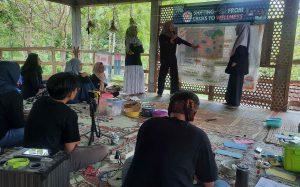
Udar Rasa
Following the welcome speech, the retreat participants were invited to do Udar Rasa (sharing lived experience). Each of them shared their experiences with understanding and self-change while attending Sudhamala School. Their presentation included several points. First, they had learned to analyze, including through intersectionality and the river of life. Through analysis, they were able to uncover layers of relationships and traumatic events in their lives.
Along the way, the analysis process encountered obstacles and challenges, particularly from the up-and-down internal process. The fluctuations in analysis were also expected to impede the overall process. Finally, in the middle of the forum, everyone realized that the up-and-down process of analyzing and discovering oneself was perfectly normal.
One participant stated that attending Sudhamala School had a positive impact on her life. The result was not only a shift in understanding sexuality and sexual violence, but also in understanding life.
“When my parents asked about Sudhamala, I told them that it is a school about life,” said Putri Awaliyah (26), one of the participants.
Another participant, Halimah Tusadyah (22 years old), stated that she had never done the unraveling process prior to attending Sudhamala School. She didn’t want to remember the past. “Now I can start doing it. I have the strength to meet my little self and thank her for being strong even though I was always thought to be weak,” she said.
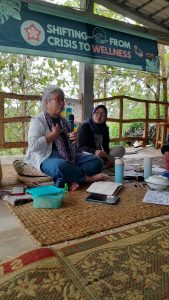
Wellness
On the second day, during the morning session, participants were invited to work together to discover their own process of unraveling using a “self-understanding chart”. Mrs. Nina (Ma’e) explained the process of unraveling, understanding, and discovering oneself during the “Mardika” session.
The session continued with a discussion about Shifting from Crisis to Wellness, or how to shift the focus away from the initial crisis and toward well-being. During the session, Ma’e explained that we have been overly focused on the state of crisis. In the context of sexual violence, we frequently overemphasize the state of being a victim, as well as the terms used to describe people who have been sexually abused.
“That’s why we often call it a crisis center, not a wellness center,” she said.
According to her, it is critical for individuals who experienced sexual violence to move on and shift their focus to wellness and healing. However, wellness and healing are abstract concepts with subjective meanings. Everyone has their own approach to achieving it. As a result, it is critical to recognize that becoming well (wellness) cannot be accomplished alone; rather, it must be worked on collaboratively with the community in order to foster a mutually supportive environment. It is also necessary to understand the welfare of the community in our environment.
Following that, the participants were asked to answer several questions about the theme and express their thoughts. The questions are as follows:
(1) What exactly is meant by “wellness” in our society? What are some concrete examples of “wellness” conditions in real life?
(2) What challenges and obstacles arise when we shift our focus from “crisis” to “wellness”?
(3) How can we ensure that the voices and needs of those who have experienced violence are not overlooked? (4) What results do you expect from the “Shifting from Crisis to Wellness” campaign?
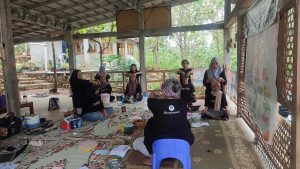
Calibration
On the third day, the morning session started with a group discussion. Participants were divided into three groups, and each wrote, discussed, and presented the most important lessons learned from the previous session’s process of analyzing and understanding themselves, as well as the biggest obstacles or challenges in the process of analyzing, and the potential they have, both personal and community, to carry out the process of self-understanding.
Following the presentation of each group’s and individual’s work, Ma’e taught one of the healing techniques using the hand-holding method. This technique demonstrates how the palm’s energy can be used to calibrate and heal the energy of others. At first glance, this technique appears to be similar to Japanese raiki, but many cultures, including Nusantara, use energy for healing.
Following that, the session continued with self-calibration through nature. The participants did this in their own unique way at Nguyahan Beach in Gunungkidul. In this activity, participants were invited to directly experience how to calibrate, both using energy from within the body and the energy field that exists in the middle of nature.
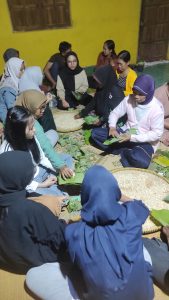
Learning with the Community
In addition to learning in a specific room, participants can also learn outside, such as on the beach, as previously explained. Other outdoor learning opportunities arose from the participants’ own initiative, such as a visit to the Tandur Bungah women’s group in Wintaos Hamlet.
After Isya, they went to Ibu RT (the Neighborhood Head) ‘s house, which is a place where local women make tempeh known as “tempe cilik“. The tempeh is smaller than regular tempeh. The advantage is that this tempeh is wrapped on the inside in banana leaves and on the outside in teak leaves.
They learned about tempeh making and other issues from these women through interaction and conversation. They were seen actively discussing water, fields, livestock, customs, and the way Gunungkidul residents live.
The Sudhamala Retreat 2024 activities, which last only 2-3 days, cannot be expected to address all issues concerning sexuality and sexual violence in Indonesia. However, this activity aims to share knowledge and experience while also conveying the message that our humanitarian problems are inextricably linked to ourselves, nature, and culture. []
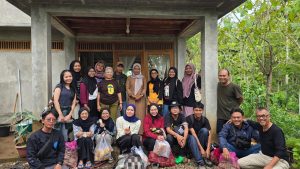
This article was translated by Napol Riel.
